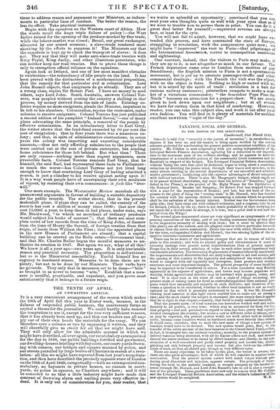THE TENTH OF APRIL.
AN UNWRITTEN ARTICLE.
IT is a very convenient arrangement of the season which makes the 10th of April fall this year in Easter week, because, in the dulness of suspended public business, the anniversary forms so capital a theme for the journalist. We could hardly have resisted the temptation to use it, except for the two very sufficient reasons, that it has already been used up, and that our readers can all sup- ply out of their own heads the materials for the essay. We can therefore save a column or two by supposing it written, and they will cheerfully give us credit for all that we might have said. They will duly allow for the admirable manner in which we might have described, all over again, our constabulary extemporized for the day in 1848, our public buildings fortified and garrisoned, our dwelling-houses bristling with bayonets, our court-yards frown- ing with cannon, our bridges and squares manned by police, and our streets patrolled by large bodies of Chartists in search of a revo- lution: all this we might have repeated from last year's recapitula- tion, and then have described the precisely opposite state of London on the 10th of Apri11849, categorically—with no extemporized con- stabulary, no bayonets in private houses, no cannon in court- yards, no police in squares, no Chartists anywhere; and it will be conceded to us that a little industry might have made this contrast of frowning alarm and smiling, peace very effective in- deed. it is only out of consideration for you, dear reader, that
we waive so splendid an opportunity ; convinced that you can read your own thoughts quite as well with your eyes shut as if we were to trouble you to peruse them in print. You can do it a great deal better for yourself ;—unprinted reveries are always best, at least for the eyes.
You will not fail to admit, however, that we might have ex- tended this process, and have contrasted the state of Europe, struggling in revolution, with the comparative quiet now; we might have "improved" the visit to Paris—that Pilgrimage of the International Association: sacred to cosmopolitan sentiment and sightseeing. One contrast, indeed, that the visiters to Paris may make, if they are up to it, is not altogether so much in our favour. The French deputation came over to London from motives of gay friendliness; the English mission to Paris is not a spontaneous movement, but is got up to promote passenger-traffic and other commercial dealings : with the French the visit was the object, with us the object is fares. Nothing so high or sacred with us, but it is seized by the spirit of trade : revolution is a bait for curious railway customers ; printsellers compete to make a mar- ket of a victorious commander; "the benevolent Pope Pius the Ninth" becomes an attraction for a puppet-show. We are much given to look down upon our neighbours ; but at all eventa we have far outrun them in that kind of marketing. However, reader, you can take this subject also, and work it out after your own fashion. You will find in it plenty of materials for another excellent unwritten "topic of the day."


























 Previous page
Previous page